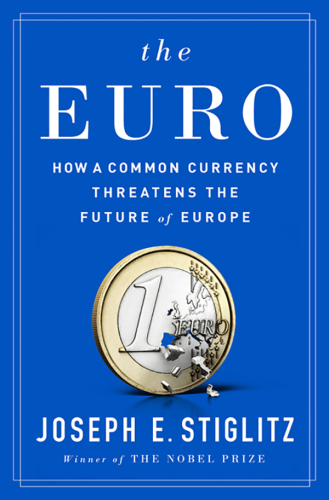
The Euro
How a Common Currency Threatens the Future of Europe
کتاب های مرتبط
- اطلاعات
- نقد و بررسی
- دیدگاه کاربران
نقد و بررسی

June 27, 2016
Nobel Prize–winning economist Stiglitz (The Great Divide) notes early on that the failings of the current European economy are “important for the entire world,” but the emphasis in this dense book is on Europe nevertheless. Most of it is spent amassing evidence (sometimes in graph form) to buttress his contention that there is a simple answer to why, despite “advances in economic science,” the European economy has failed: the 1992 decision to adopt the euro, a single currency for 19 separate countries. Stiglitz believes that the euro has failed to meet its economic and political objectives, and he methodically lays out in detail why that has happened. His concluding section offers advice for a productive way forward that would save the euro and achieve the “shared prosperity and solidarity” that it originally had promised. Despite Stiglitz’s best efforts, this is not an easy book for casual readers; the subject matter, which requires analysis of sophisticated economic phenomena such as quantitative easing, is just too complex to be made accessible, though Stiglitz tries to leaven the complexity with grimly amusing and digestible anecdotes.

June 15, 2016
A tale of monetary union and its discontents.Nobel Prize winner Stiglitz (Economics/Columbia Univ.; Rewriting the Rules of the American Economy: An Agenda for Growth and Shared Prosperity, 2015, etc.), long a nuanced critic of globalization, turns his attention to the doomed project that is the single European currency, the euro. Doomed, that is, because it presupposes an economic integration into a single economic community that has not been matched by the necessary political integration. The eurozone may be a single entity in theory, but in reality, it harbors competing national interests. Furthermore, any government requires the ability to develop and enforce its own regulations, a cause for conflict within any overarching union. Stiglitz sees within the push for the single currency the same neoliberal motivations as for globalization, a related process, and those, not surprisingly, involve making the rich richer at the expense of the poor. In the case of Europe, the byword for the poor is Greece, the nation that has perhaps suffered most in the cause of economic integration, where wage and pension decreases have had catastrophic effects, including a general devaluation of the economy. "Internal devaluation increases economic fragility by bringing more households and firms to the brink of bankruptcy," he writes. "Inevitably, they cut back on spending on everything." Lack of spending in a consumer economy yields disaster, and in the case of Greece, "the best evidence is that a country that goes through a deep downturn never bounces back to make up for what is lost. What is lost is lost forever." Short of dissolving an economic union that he regards as ill-advised, Stiglitz examines possible palliatives, including allowance for more economic flexibility within the EU, with different areas trading at different values. That economic union can and should be saved, he writes, but only if it truly means the creation of "the shared prosperity and solidarity that was part of the promise of the euro." A cogent and urgent argument of compelling interest to economists and policymakers.
COPYRIGHT(2016) Kirkus Reviews, ALL RIGHTS RESERVED.

August 1, 2016
According to Nobel Prize-winning economist Stiglitz (economics, Columbia Univ.; The Great Divide), the creation of a single currency, the euro, for the European Union (EU) was a mistake. This book details both the problems as well as potential solutions. The 2008 financial crisis tested global economies, and in Europe, economics and politics remained out of sync, without sufficient structures in place to accommodate the economic diversity of the EU member countries. The first three parts of the text look at the issues, in both policy and structure, of a single currency for such diverse member nations, while the final section offers viable options for moving forward, including reforms, a more flexible single currency, or eliminating the euro altogether. VERDICT Stiglitz does not provide a history of the euro or the EU, but rather focuses on the economic implications and alternatives to the euro as it is today and could be in the future. This title will appeal to those with an interest in economics and politics.--Elizabeth Nelson, McHenry Cty. Coll. Lib., Crystal Lake, IL
Copyright 2016 Library Journal, LLC Used with permission.

























دیدگاه کاربران